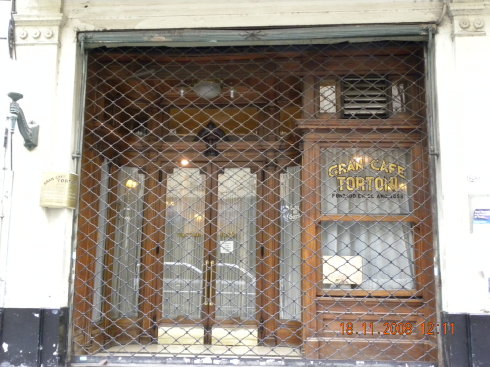Tortoni, the oldest coffee shop in Argentina
Follow the caf é (Wechat official account vdailycom) and found that Beautiful Cafe opened a small shop of its own.
The door of the Cafe Tortoni, the oldest cafe in Buenos Aires, Argentina, is inscribed with the 1922 poem "singing about Love, Sunshine and Water" (Canto de Amor, de Luzy de Agua) by the 1940s Argentine poet Bardo Melo Fern á ndez Moreno (1886, 1950m).

The long Spanish poem is filled with the poet's nostalgia for Tortoni Cafe and a touch of melancholy and repressed sigh for the famous South American city of Buenos Aires.
"Buenos Aires in 1880 was the most chaotic, busiest, most vibrant and desolate city in the world. . The Tortoni Cafe at 826 Wadavia Street has just opened, with gentlemen and ladies wearing the most fashionable clothes in Paris. But the owner of the city is not them, but belongs to the European labourers known as "swallows". There are a large number of them, with the best dreams and hopes, they leave their homes and come to the ends of the earth. They build humble houses in the corners of the city like hard-working ants, and then live together.
The above paragraph is a description of the miraculous economic development of Argentina in the 19th century. according to this passage, I can say without exaggeration: Tortoni Cafe reflects the economy and humanities of an era; it bears witness to the changes and vicissitudes of Argentina's modern history; it represents the unique mixed-race culture of Argentina, which has been colonized by the Spaniards for hundreds of years.
The Toltoni Cafe, which was opened by the French in its early days, was originally built on Esmeralda Street (La calle Esmeralda) in 1858 and moved to its present location in 1880: 825 May Street (Avenida de Mayo), with another entrance on Wadavia Street, a French new art building. (note: it is recorded in a lot of materials that 826 Wadavia Street is her main entrance, but it is actually wrong. I specially went around to 826 Wadavia Street to check on the field. in fact, the main entrance is 825 May Street, while 826 Wadavia Street is only the back door, which is mainly the door for garbage employees to get in and out.
The Tortoni Cafe pioneered the literary cafe in Buenos Aires. For more than a hundred years, many famous artists, writers and intellectuals in Argentina have often appeared here (on the walls of cafes, pictures of these visiting celebrities can be seen everywhere), they hold parties, discuss art, recite literary works and play new works of music. Until now, Tortoni Cafe still has jazz and tango singing, which is a noble place with a rich artistic atmosphere.
Related readings:
The Cafe Ruti, the birthplace of French writer Pierre's maiden work
The Pierre Loti in Istanbul is probably the most famous coffee shop in the city.
Pierre Loti Cafe is named after the famous French writer Pierre Lotte, who is said to be obsessed with "Turkish coffee" in Istanbul and here. In 1879, his debut novel "Agiaday" was born in what is now the Ludi Cafe.
Pierre Rutti, formerly known as Lianvio (1850tel 1923), was born in Rochefort in western France. He was infatuated with the sea when he was young, and later became a naval officer. He has traveled almost all over the world for 42 years. Therefore, he does not need much imagination. Just writing down what he has seen and heard along the way is enough to make readers fascinate the fantasy world.
In 1879, Rudy published his first novel about Turkish scenery and his love affair, and the following year he serialized his Marriage in newspapers. These two novels established his reputation as a writer. Since then, at the rate of almost every year, he has published twelve novels, nine documentary essays (including the end of Beijing, which is about the burning of Old Summer Palace by Anglo-French allied forces), and a number of autobiographical works. In 1891, he was awarded the honor of "Forty Immortals" of the French Academy.
Important Notice :
前街咖啡 FrontStreet Coffee has moved to new addredd:
FrontStreet Coffee Address: 315,Donghua East Road,GuangZhou
Tel:020 38364473
- Prev

How should the interior of the cafe be laid out?
The preparation work of the coffee shop includes many, among which the layout of the coffee shop occupies the most important position in the decoration of the whole cafe. The unique style, prominent theme decoration, fully functional and easy-to-use layout is the successful interior design of the coffee shop. Usually, the interior space of the coffee shop can be divided into guest space (dining area, reception room, cloakroom, etc.) and public space according to the function.
- Next

A real "street cafe", a feeling of "being outdoors"
A real street cafe has been opened in Hong Kong, where customers who enjoy coffee can interact with pedestrians on the street at will. This coffee shop is designed by James JJ Acuna from JJA/Bespoke Architecture Company. The coffee shop is named Elephant Grounds. It is located on the street corner of the busy block. The decoration style is simple and warm, highlighting the integration of indoor and outdoor.
Related
- What documents do you need to go through to open a coffee shop? coffee shop coffee shop certificate processing process
- How to purchase Coffee beans in small Cafe how to choose a suitable supplier for domestic Coffee supply Company
- How to drink Starbucks Fragrance White Coffee? how to make Australian White Coffee? what Italian coffee beans are recommended?
- The Story of Flora Coffee: the name of Flora Coffee Bean and the implication of the Flowers on Florna Coffee
- How much does a cup of coffee cost? How much is the profit of a cup of coffee? What is the profit of the coffee shop in a year?
- Yunnan small Coffee, known as "fragrant Coffee", introduces the characteristics of Alpine Arabica Coffee producing areas in Yunnan, China
- 2023 latest Starbucks full menu price list how much is a cup of Starbucks coffee what is better to drink the most popular hot and cold drinks recommended
- Starbucks different kinds of Coffee Price list Starbucks menu 2023 Top Ten Best drinks in Starbucks
- Starbucks Spring praise Comprehensive matching Coffee Bean theme Story Packaging implication and taste description
- The cost of a cup of coffee latte American coffee cost price and selling price

